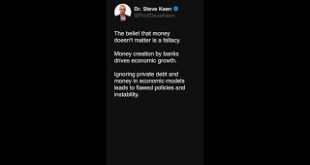Money is often dismissed as a mere tool. People think it doesn’t matter in the grand scheme of things. This belief is a dangerous fallacy. Money creation by banks is the lifeblood of economic growth. When banks lend money, they create new deposits. This process fuels spending, investment, and ultimately, growth. Ignoring private debt in economic models is like ignoring the engine in a car. Without it, the vehicle won't move. Mainstream economists, like Ben Bernanke,...
Read More »Blog Archives
Pluralism & teaching in economics
[embedded content] My colleague and friend Geoff Schneider on teaching and pluralism in economics. He was the director of the Teaching & Learning Center at Bucknell, when I arrived here, and I learned quite a bit from him. At any rate, worth watching it.
Read More »How Rome Reversed Christianity: from Compassion to Control
[unable to retrieve full-text content]Brian: All right, Nate, we’ve done it. This is the System Failure Podcast number 50, and it’s an exciting one. Nathan: Yeah, number 50. Yeah, that’s impressive, Brian. That means we’ve been at this for more or less a year now, which is pretty exciting. And I love the idea that for episode number 50, Continue Reading The post How Rome Reversed Christianity: from Compassion to Control first appeared on Michael Hudson.
Read More »Cochrane on PRICE-GOUGING
from Peter Radford Price-gouging is now a topic in politics. Kamala Harris has put it there. Naturally there has been the predictable outcry of opposition coupled with and equally predictable sneer of disapproval: how could she say something so uneducated? Has she no grasp of Econ.101? Oh the illiteracy! Perhaps even more predictable is that someone like John Cochrane has felt it necessary to write an article in praise of price-gouging. After all, hard core libertarian economists are...
Read More »Albertsons Give Away
Follow the stories below about Albertsons and Kroger give away of following the money . . . In 2022; Albertsons is set to give away a third of its value to its private equity owner Cerberus and to other investors. The publicly traded supermarket chain Albertsons will pay a $4 billion special dividend in early November. That will occur if the SEC or other regulators do not intervene in the merger. The give-away dividend equals about a third...
Read More »Outside Europe it’s normal to protect basic energy needs – so why don’t we?
Blog Outside Europe it’s normal to protect basic energy needs — so why don’t we? The majority of the world's population uses tariffs which guarantee cheap essential energy. Time for the UK to pay attention. By Alex Chapman 22 August 2024 With the...
Read More »Buckle up. This ride is going to get crazy.
A lot of change is coming that many are not expecting.
Read More »Ukraine’s Hiroshima moment is drawing closer (the consequences of Neocon madness)
In August 1945, the US atom bombed the Japanese cities of Hiroshima and Nagasaki. Since then, nuclear weapons have never been used in conflict. That may soon change as Ukraine faces the increasing likelihood of a Hiroshima moment. Conditions in Ukraine increasingly give Russia military and geopolitical cause to use tactical nuclear weapons. Though Russia […]
Read More »House Price Bubble About to Burst?
House Price Bubble About to Burst?
Read More »Tubular bells
.[embedded content]
Read More » Heterodox
Heterodox




